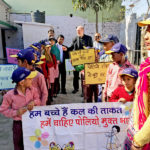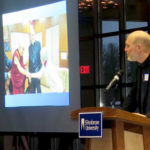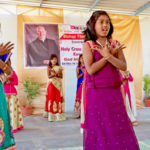Vandals worked under cover of darkness to spray paint racist messages on an Iowa City church that serves a multicultural congregation, including African refugees and immigrants from other countries. Two-hundred people of diverse faiths, backgrounds and ages responded with light — during a vigil at the church on March 12. Just three days later, a gunman described as a “white nationalist” was taken into custody for a mass shooting that killed 50 people worshipping in two mosques in New Zealand.
While these two crimes — vandalism and murder — are not equal in gravity, they have been cultivated in the same environment: hatred that has spread like weeds across the globe. That hatred demands our attention, and what better time than this Lent when we are focused on conversion of our hearts?
The vandalism at Greater Iowa City Church of the Nazarene targeted African refugees and immigrants from other countries with malicious statements, vengeful verses taken out of context from the Bible and swastikas scrawled on the church building. Police have not yet located the vandals. Senior Pastor Teresa Stecker suspects the vandals were involved with an organized hate group. A key part of the church’s ministry has become its work with refugees, immigration and teaching English as a second-language.
When the Diocese of the Davenport was resettling refugees in the Iowa City metro area, the Church of the Nazarene and its nonprofit, Iowa City Compassion, were among the most valuable community resources, said diocesan Social Action Director Kent Ferris. Their efforts included providing English classes, food supplies and other formal ministry offerings as well as friendly, personal support. The hateful graffiti targeting their efforts to support immigrants and refugees is an affront to the Gospel.
Johnson County Interfaith Coalition, of which St. Patrick Parish in Iowa City is a member, responded with a prayer vigil to show solidarity. The prayer vigil should be the beginning of an individual and collective response to prevent cultivation of an environment that allows hatred to grow and flourish in our hearts and in the public square.
• We begin with prayer. Choose whatever form of prayer resonates with you. The more we pray, the more likely we are to hear God’s voice as we consider the choices we make in our daily lives.
• We read Scripture, particularly the daily readings for this Lent. Devotional guides can aid our reflection on the readings. Bishop Robert Barron’s daily Gospel reflections, for example, are brief and thought-provoking. They focus on what really matters, the salvation of all souls. The reflections are available online at www.lentreflections.com.
• We engage in dialogue with someone of another viewpoint. When we avoid speaking and listening respectfully to someone with another point of view, we deepen the division that allows hatred to take root. Visit the Better Angels website at www.better-angels.org, which offers insights on talking across the political divide. Representatives from the group conducted a workshop last week at The Canticle, home of the Sisters of St. Francis of Clinton.
• We step outside our comfort zone to get to know someone from another faith group. Bishop Thomas Zinkula recently returned from a journey to India where he interacted with Buddhists, Hindus, Muslims, Christians and people of other faiths. Two of his Indian priest friends oversee Catholic schools whose students are mostly Hindus and Muslims. The education received by these children, many from impoverished families, will help them to have a better future. “As a church, we serve others not because they are Catholic, but because we are,” the bishop says. We don’t have to travel to India to encounter people of other faiths. We can check our community calendars or with other faith communities in our area for opportunities to participate in their celebrations.
The hatred expressed against a church in Iowa City “is a reflection of the society in which we exist. If it’s in society, it’s in the church,” says Father Rudolph Juarez, pastor of St. Patrick Church in Iowa City. And so, a response must come from the church. “We have to continue to preach the Gospel and conversion of heart. That’s the only way things are going to change.”
Barb Arland-Fye, Editor
(arland-fye@davenportdiocese.org)











